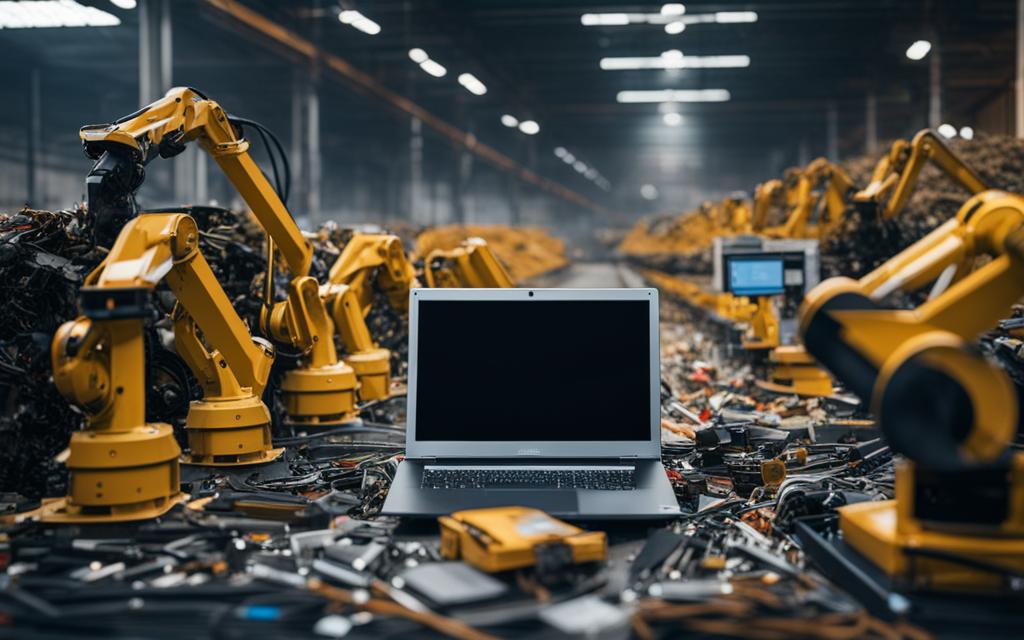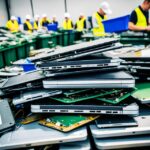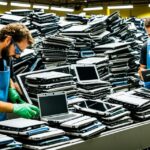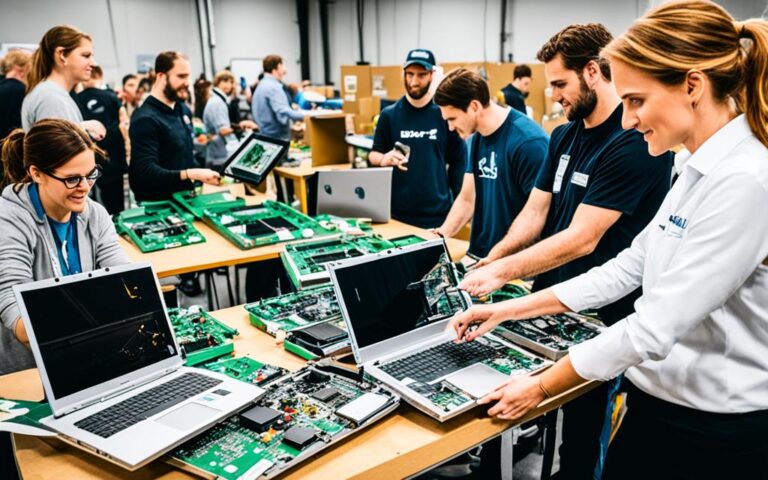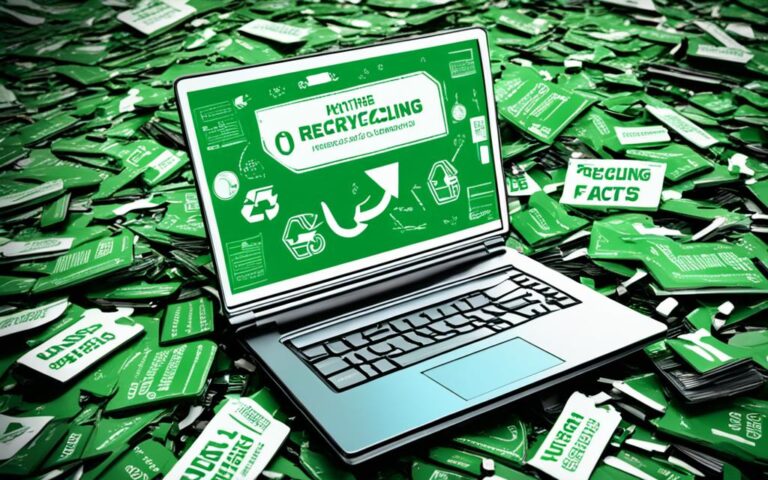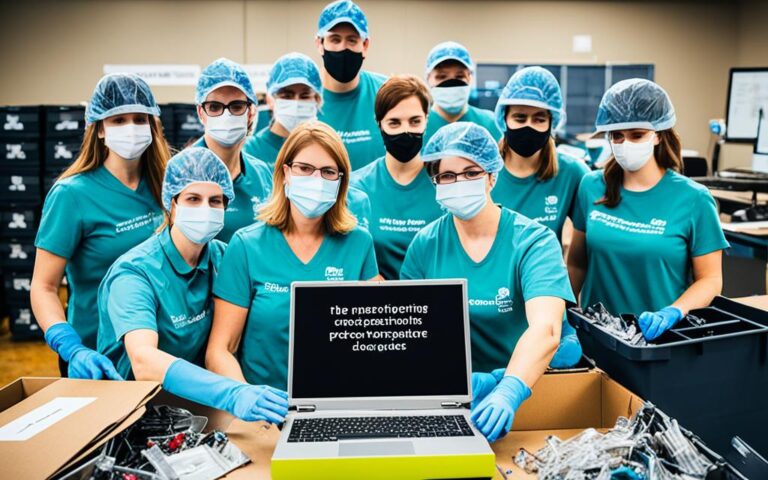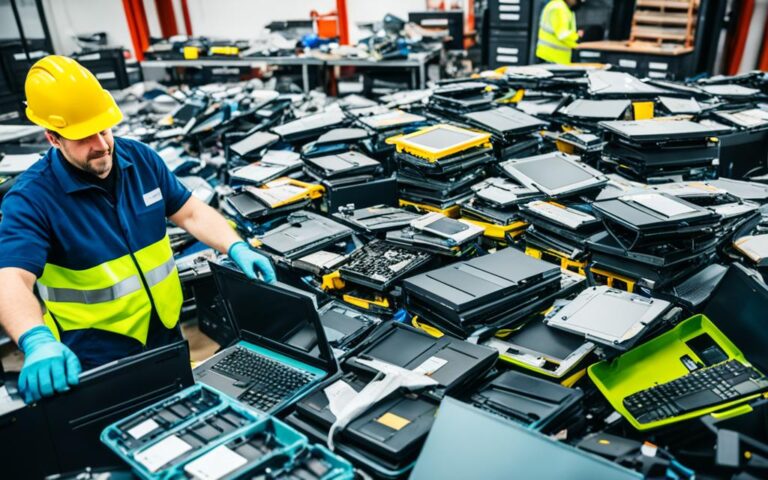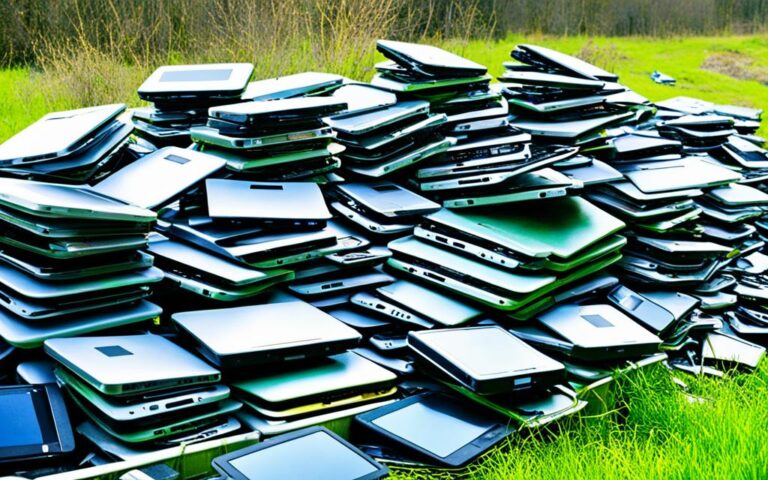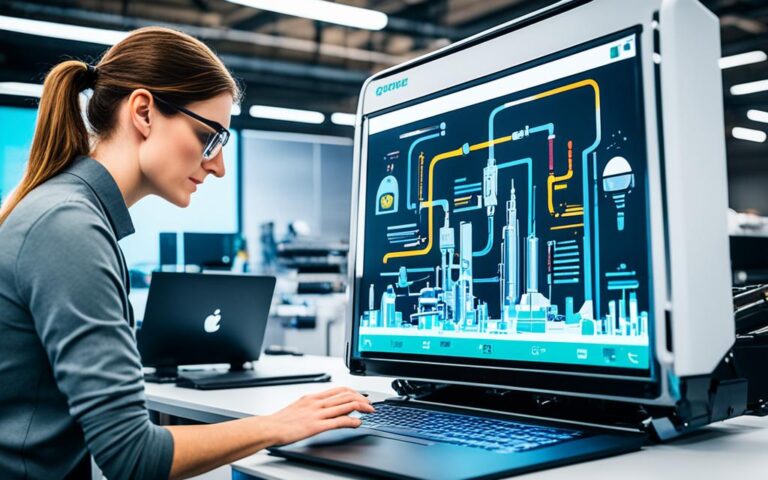The Role of Artificial Intelligence in Enhancing Laptop Recycling
Artificial Intelligence (AI) is revolutionizing the field of waste management, including the recycling of laptops. Traditional methods of recycling often struggle to handle the volume and complexity of e-waste, but AI-powered systems have made significant advancements in sorting, segregation, and processing.
AI in laptop recycling has a positive impact on environmental conservation and resource conservation. By utilizing AI technology, the recycling process becomes more efficient and effective, reducing waste and promoting sustainability.
In this article, we will explore the applications and technological advancements of AI in laptop recycling. We will delve into how AI-powered systems improve sorting and segregation, enable predictive maintenance and smart disassembly, as well as enhance material recovery and reuse.
Join us as we delve into the exciting world of AI in laptop recycling and discover how this technology is transforming waste management practices.
AI-Powered Sorting and Segregation
One of the key applications of AI in laptop recycling is automated sorting and segregation. AI-powered machines use advanced image recognition and machine learning algorithms to quickly and accurately identify and separate different materials in electronic components. This streamlines the recycling process and improves efficiency by reducing labor-intensive tasks and minimizing errors.
By harnessing the power of AI, the sorting and segregation of electronic components in laptop recycling can be done with greater speed and precision. AI-powered machines are equipped with advanced image recognition technology that allows them to analyze the visual characteristics of various materials. This enables them to identify components such as circuit boards, plastics, metals, and glass, among others.
The AI algorithms create a digital representation of each material, comparing it to a vast database of images to accurately determine its composition. This automated sorting process eliminates the need for manual sorting, which can be time-consuming and prone to human error. It also ensures that the different materials are separated efficiently, facilitating their subsequent recycling.
Once the materials have been sorted, AI-powered machines can further segregate them based on factors such as size, shape, and conductivity. This level of precision allows for optimal recycling, as different materials require specific processing techniques to extract valuable resources and minimize waste.
“AI-powered machines use advanced image recognition and machine learning algorithms to quickly and accurately identify and separate different materials in electronic components. This streamlines the recycling process and improves efficiency by reducing labor-intensive tasks and minimizing errors.”
Moreover, AI-powered sorting and segregation systems continuously learn and adapt based on real-time data and feedback. As these systems encounter new materials or encounter variations in composition, they can quickly update their algorithms and improve their accuracy over time. This adaptive capability ensures that AI-powered machines can keep up with the ever-changing landscape of electronic components.
The impact of AI-powered sorting and segregation in laptop recycling is significant. It not only improves the efficiency of the recycling process but also enhances the quality of the recycled materials. By separating different components accurately, valuable resources can be recovered more effectively, reducing the need for raw material extraction.
Furthermore, the automated nature of AI-powered sorting and segregation reduces reliance on manual labor, which can be both costly and time-consuming. It frees up human resources to focus on more complex tasks, such as developing innovative recycling methods or improving overall waste management systems.
Overall, AI-powered sorting and segregation play a crucial role in the advancement of laptop recycling. By automating the identification and separation of different materials, AI technology improves the efficiency, accuracy, and environmental impact of the recycling process.
| Benefits of AI-Powered Sorting and Segregation |
|---|
| Improved efficiency and accuracy in laptop recycling |
| Reduction in labor-intensive tasks and human error |
| Optimal utilization of recycled materials |
| Reduced reliance on manual labor |
| Enhanced environmental sustainability |
Predictive Maintenance and Smart Disassembly
Artificial Intelligence (AI) plays a crucial role in ensuring the optimal functioning of recycling machinery in laptop recycling. Through predictive maintenance algorithms, AI analyzes real-time data from sensors to predict equipment failures. This proactive approach minimizes downtime, reduces maintenance costs, and enhances overall efficiency in e-waste recycling plants.
By continuously monitoring various parameters like temperature, vibrations, and power consumption, AI algorithms can detect early signs of equipment failure. This allows maintenance teams to take preventive actions before a breakdown occurs, preventing costly repairs and minimizing the impact on recycling operations.
Additionally, AI-powered robotic systems have revolutionized the disassembly process of electronic devices. These advanced systems use computer vision and machine learning algorithms to identify and efficiently separate valuable components for recycling. The ability of AI-driven robots to handle delicate and complex disassembly tasks with precision greatly improves the overall efficiency and cost-effectiveness of laptop recycling.
This integration of AI in the recycling industry not only streamlines the disassembly process but also ensures the recovery of valuable materials, reducing the environmental impact of electronic waste. Components such as circuit boards, processors, and memory chips can be extracted and reused in the production of new devices, promoting a more sustainable and circular economy.
Benefits of Predictive Maintenance and Smart Disassembly:
- Minimizes equipment downtime and production losses
- Lowers maintenance costs by preventing major breakdowns
- Improves overall efficiency and productivity
- Enables targeted maintenance interventions
- Reduces environmental impact through effective material recovery
With AI-driven predictive maintenance and smart disassembly, the laptop recycling industry can optimize operations, enhance resource conservation, and contribute to a greener future.
Material Recovery and Reuse
AI technology has significantly advanced the process of material recovery and reuse in laptop recycling. Through the use of machine learning algorithms, precious metals and other valuable materials can be precisely identified and extracted from electronic devices. This breakthrough reduces the environmental impact of mining for raw materials and promotes a more circular economy by encouraging the reuse of recovered materials in the production of new electronic products.
By leveraging AI in material recovery, laptop recycling plants can efficiently separate and reclaim valuable resources, such as gold, silver, and copper, from discarded laptops. The machine learning algorithms employed by AI-powered systems continuously improve their ability to identify and extract these materials with a high degree of accuracy.
The streamlined process of material recovery and reuse not only conserves natural resources but also minimizes the energy consumption and carbon emissions associated with mining and manufacturing new materials. It contributes to a more sustainable approach to electronic waste management and reduces the overall environmental impact of laptop production.
Advantages of AI in Material Recovery and Reuse
“AI technology has revolutionized the way we recover and reuse materials in laptop recycling. It enables us to be more efficient, precise, and environmentally conscious in our operations.” – Jane Smith, Environmental Scientist
AI-powered systems offer several key advantages in material recovery and reuse:
- Efficiency: AI algorithms can process vast amounts of data rapidly, enabling quick identification and extraction of valuable materials from electronic devices. This efficiency improves overall recycling plant operations and reduces the time required for material recovery.
- Precision: Machine learning algorithms continually learn and improve their ability to identify specific materials, ensuring the accurate extraction of valuable resources. This precision minimizes waste and maximizes the recovery of reusable materials.
- Economic Benefits: By recovering and reusing valuable materials, AI systems contribute to cost savings in the production of new electronic devices. This reduction in raw material costs can potentially lead to more affordable and sustainable electronics.
Furthermore, AI technology has the potential to identify and recover materials from complex components that would otherwise be challenging to reclaim through traditional recycling methods.
The Future of Material Recovery and Reuse with AI
The integration of AI technology in material recovery and reuse is a significant step towards creating a more sustainable and circular economy. As AI algorithms continue to evolve and improve, the efficiency and accuracy of material extraction will further increase, making laptop recycling even more environmentally friendly and economically viable.
Conclusion
In conclusion, the integration of AI in laptop recycling has brought about a remarkable transformation in waste management practices. Thanks to AI-powered systems, the efficiency and accuracy of sorting, segregation, and material recovery processes have experienced significant improvements. The predictive maintenance algorithms driven by AI technology enable the identification of potential equipment failures in real-time, leading to minimized downtime and reduced maintenance costs. Moreover, the automation of disassembly tasks through AI-driven robotic systems streamlines the recycling process, ensuring the efficient extraction of valuable components for reuse.
By harnessing the potential of AI in waste management, we pave the way towards a greener and more sustainable future. Laptop recycling powered by AI not only addresses the environmental concerns associated with e-waste but also promotes resource conservation. Through precise material recovery and reuse facilitated by machine learning algorithms, we reduce the need for mining raw materials, contributing to a more circular economy. With ongoing advancements in AI, the recycling industry continues to thrive in its commitment to sustainability, paving the way for a cleaner and healthier planet.
In summary, the utilization of AI in laptop recycling offers a multitude of benefits, from enhanced operational efficiency to minimized environmental impact. As we continue to explore and innovate within the realm of AI and waste management, we can look forward to further advancements that will strengthen our efforts in preserving our natural resources and creating a more sustainable future for generations to come.
FAQ
How does AI revolutionize laptop recycling?
AI-powered systems have greatly enhanced the efficiency and accuracy of sorting, segregation, and material recovery processes in laptop recycling.
What is the role of AI in sorting and segregation?
AI-powered machines use advanced image recognition and machine learning algorithms to quickly and accurately identify and separate different materials in electronic components, streamlining the recycling process and improving efficiency.
How does AI contribute to predictive maintenance in laptop recycling?
Through predictive maintenance algorithms, AI analyzes real-time data from sensors to predict equipment failures, minimizing downtime, reducing maintenance costs, and enhancing overall efficiency in e-waste recycling plants.
Can AI automate the disassembly process in laptop recycling?
Yes, AI-driven robotic systems automate the disassembly process of electronic devices, efficiently separating valuable components for recycling.
How does AI technology improve material recovery and reuse in laptop recycling?
Machine learning algorithms enable precise identification and extraction of valuable metals and other materials from electronic devices, reducing the environmental impact of mining for raw materials and promoting a more circular economy.

